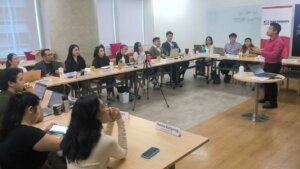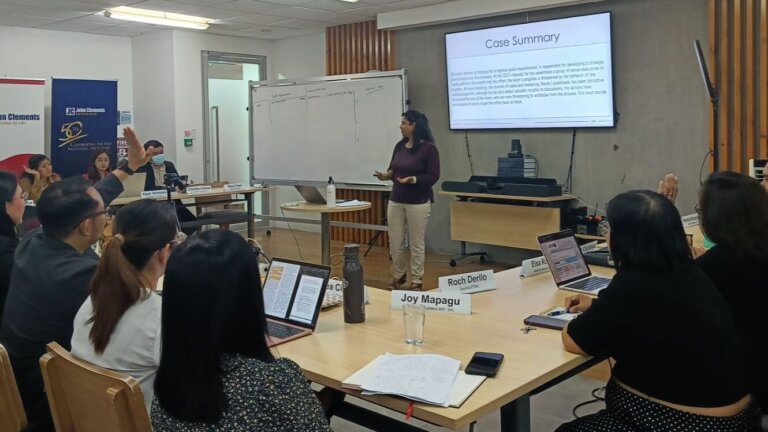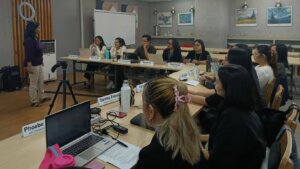The John Clements New Managers Program is a dynamic and thoughtfully designed training series that equips both new and experienced managers with essential leadership skills. It helps them confidently navigate today’s complex business environment. The program stands out for its carefully selected modules, premier on-demand learning resources, and curated Harvard Business School case studies. Participants gain meaningful value through relevant insights, concise content, personalized growth journeys, and practical tools that integrate seamlessly into daily leadership practice.

Managing a Team
In Session 5 of the John Clements New Managers Program, titled Managing a Team, participants engaged in a powerful exploration of one of leadership’s most essential responsibilities: effectively leading and managing teams. Anchored by the insightful case study “The Team That Wasn’t,” the session shed light on the dynamics of teamwork and the critical role of alignment, collaboration, and shared purpose in building cohesive, high-performing teams.
Pre-Work Activity: Strengthening Multigenerational Relationships
To deepen the learning experience, the session included a three-part pre-work activity. This component focused on strengthening working relationships across generations, specifically Baby Boomers, Generation X, and Generation Y.
Through this activity, participants explored practical frameworks and real-world examples. These helped them understand each generation’s unique background, values, communication styles, and work ethics. As a result, the exercise encouraged deeper reflection and greater appreciation for generational diversity. It also promoted inclusivity and improved team dynamics.
By gaining these insights beforehand, managers learned to lead with empathy and adaptability. They were better prepared to appreciate the strengths each generation brings to the workplace. This pre-work also laid the groundwork for more meaningful discussions during the session. More importantly, it equipped participants with strategies for building stronger and more collaborative teams.
Case Study: “The Team That Wasn’t”
The session proved to be both deeply engaging and richly insightful, with a strong focus on the compelling case study “The Team That Wasn’t.” This thoughtfully selected narrative illustrated the journey of a group of accomplished professionals—each highly capable in their own right—who, despite their impressive credentials and potential for high performance, faced significant internal struggles. These included recurring miscommunication, lack of trust, unclear roles, and minimal leadership involvement. These challenges created roadblocks that ultimately hindered the team’s ability to function cohesively and deliver results.
Throughout the session, participants were guided to analyze the root causes of the team’s dysfunction, allowing them to see beyond surface-level issues and reflect on the foundational elements that contribute to—or detract from—effective teamwork. It became clear that success within a team environment cannot be achieved through talent alone. Rather, a truly successful team is built on mutual trust, psychological safety, empathy, and a well-articulated shared vision. The case powerfully emphasized that leaders must take proactive roles in setting the tone, clarifying expectations, and fostering an environment where collaboration can flourish.
Interactive Role-Playing Activity
A standout part of the session was the interactive role-playing activity. Participants were grouped into teams and assigned roles based on the case study characters. This immersive method allowed them to experience real-life team dynamics and leadership challenges from different perspectives.
As participants stepped into these roles, they developed a deeper understanding of diverse viewpoints, emotional triggers, and interpersonal behaviors. These firsthand experiences led to richer discussions and more meaningful insights.
The activity also encouraged self-reflection. Participants examined their own leadership styles and considered how they might respond in similar situations. The session concluded with each individual sharing personal takeaways, such as the value of empathy, active listening, and clear communication.
Insights That Resonate
Session 5 offered more than just strategy and theory. It emphasized the importance of building inclusive cultures, nurturing genuine connections, and aligning teams toward shared goals. Thanks to the experiential learning methods, participants walked away with practical strategies they can apply immediately.
An effective team leader builds authentic connections with each member. Through regular one-on-one conversations, leaders gain deeper insights into individual motivations, working styles, and perspectives. This approach fosters a respectful, collaborative atmosphere. It also ensures that team members feel valued and understand their contributions to the team’s success.
Additionally, clear role definitions help prevent confusion and duplication of effort. Open communication and regular feedback promote psychological safety, which fuels innovation and teamwork.
Cultural awareness and emotional intelligence also play critical roles in managing diverse teams. These traits help leaders respect differences, handle expectations, and build inclusive environments. Ultimately, leaders must model the values they want to see, address conflicts early, and guide their teams toward shared goals based on trust and collaboration.
Ready to Lead Your Team More Effectively?
Discover how the John Clements New Managers Program empowers leaders with practical tools for effective team leadership. Contact us today to learn more.







